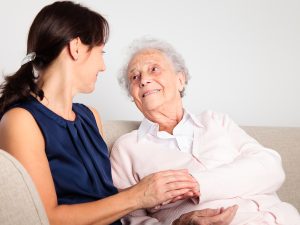 Dementia is a general term used to describe the loss of cognitive functioning, this includes memory, language, reasoning, and other mental abilities. It is also common to experience changes in vision, depth perception, hearing, and sensitivity to temperatures. Although dementia occurs more commonly in the elderly, it is not a normal part of aging.
Dementia is a general term used to describe the loss of cognitive functioning, this includes memory, language, reasoning, and other mental abilities. It is also common to experience changes in vision, depth perception, hearing, and sensitivity to temperatures. Although dementia occurs more commonly in the elderly, it is not a normal part of aging.
Symptoms of dementia can affect a person’s ability to conduct normal activities. They can also pose a threat to personal safety.
Individuals with dementia may get lost in a familiar neighborhood, become confused, forget the name of objects around the house, have trouble with balance, or may not be able to complete tasks independently. Following these tips can reduce the risk of potential hazards and help keep someone living with dementia safe at home:
- Display emergency numbers and your loved one’s home address near all telephones.
- Install smoke and carbon monoxide detectors throughout the home, and make sure they are in working order.
- Avoid clutter.
- Keep plastic bags out of reach.
- Remove or lock up all guns or weapons.
- Install safety locks on guns or remove ammunition.
- Keep all medications in a locked cabinet or drawer.
- Install grab bars in showers, bathtubs, and on toilets.
- Secure large furniture to prevent tipping.
- Mark the edges of stairs with neon-colored, glow-in-the-dark tape.
- Place stickers or decals on glass doors.
- Place “STOP” signs on all doors leading outside.
- Install alarms on doors and windows.
- Place deadbolts or latches on doors above eye level.
- Keep car keys hidden.
- Keep potentially dangerous kitchen tools such as knives locked up.
- Remove the knobs from stoves.
- Install appliances with an automatic shut-off feature.
- Throw away decorative food or toxic plants that may be mistaken for real food.
- Lower the temperature setting on water heaters.
- Cover heating pipes and radiators.
These tips will help loved ones remain safe in their homes and live independently for as long as possible. As the disease progresses, safety precautions will have to be adjusted to adapt to a person’s abilities.
All content of this newsletter is intended for general information purposes only and is not intended or implied to be a substitute for professional medical advice, diagnosis or treatment. Please consult a medical professional before adopting any of the suggestions on this page. You must never disregard professional medical advice or delay seeking medical treatment based upon any content of this newsletter. PROMPTLY CONSULT YOUR PHYSICIAN OR CALL 911 IF YOU BELIEVE YOU HAVE A MEDICAL EMERGENCY.
